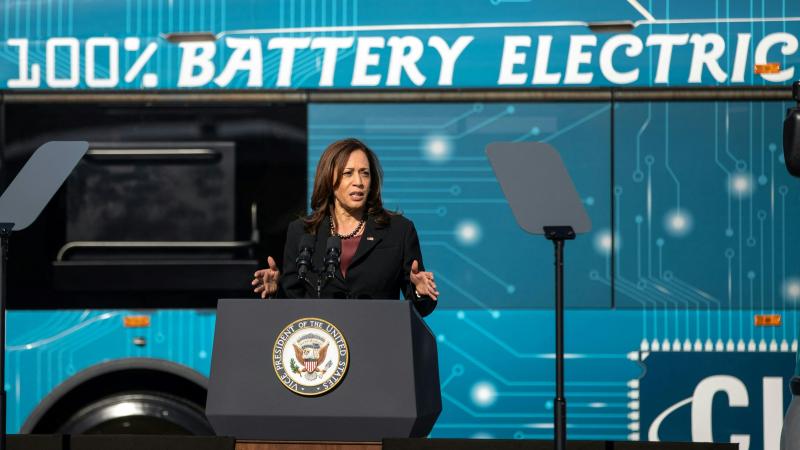MAGA activist Starbuck rented Tennessee home in 2018, likely shielding him from new residency bill
Conservative ex-filmmaker says state legislators trying to nullify his candidacy.
Republican candidate Robby Starbuck began renting a Tennessee home in late 2018, potentially making him eligible to run in Tennessee's 5th Congressional District this year even if state legislation to amend residency requirements becomes law, according to real estate records obtained by Just the News.
Starbuck, a filmmaker and music video producer, signed a lease to start renting a home in Williamson County, Tenn., in December 2018 and completed the full purchase of the same home in June 2019.
The bill under consideration in the Tennessee General Assembly requires people to meet the residency requirements for state senators and representatives in order to qualify to run in a primary election for the U.S. House or Senate.
To be eligible for the state house, candidates are required to have established residency in Tennessee three years before the election, been a resident in the county one year immediately preceding the election, and been a qualified voter of the district by Election Day.
Whether one uses the date of the 2022 general election, Nov. 8, or the date of the Republican primary, Aug. 4, Starbuck said he was a Tennessee resident three years prior — and is therefore eligible to run.
Several media outlets, including local press in Tennessee and national papers such as the New York Times, have reported the bill would make Starbuck an ineligible candidate due to the three-year requirement.
Starbuck's lease, home purchase, and utility bills would be sufficient to show he's a resident for a range of services in Tennessee, such as obtaining a driver's license. However, some observers argue that may not be enough to prove an establishment of residency for the purposes of becoming a candidate since he was still dealing with his affairs in California, his prior home.
While Starbuck's eligibility is a point of contention, no one doubts the bill would prevent Morgan Ortagus, who served as a State Department spokeswoman in the Trump administration, from running.
Ortagus moved to Nashville last year and announced her candidacy as a Republican in Tennessee's 5th District earlier this month. (President Trump endorsed Ortagus, triggering backlash among prominent conservatives who support Starbuck.)
The original version of the bill, introduced by Tennessee state Sen. Frank Niceley (R) earlier this month, said that candidates for the U.S. House or Senate had to have voted in the three previous elections in Tennessee in order to be eligible. State Rep. David Wright (R) introduced a companion bill in the House.
Niceley has declined to say if any specific candidates inspired his legislation. However, recent comments provide some hints about his motivations.
His bill would aim to "protect Tennessee from invasion," Niceley told Axios last week. "We became a well-managed state because we elected Tennesseans who know how to pronounce 'Maury County.'"
Maury County Mayor Andy Ogles (R), who's considering running in the 5th District, echoed Niceley's comments about trying to root out "transplants," a term being used by Tennessee press and supporters of the bill to describe candidates who recently moved to the state.
"We can't be expected to bow down," he told the Daily Herald. "We need someone who knows this district, someone who fits the mold. I believe we can find someone who has roots here and has been here for at least a few years."
Ogles named Beth Harwell, a former Republican House speaker who just announced her candidacy in the race, as a longtime resident with "roots" in the 5th District.
Days after the bill was introduced, it was amended to its current version, which is now making its way through the legislative process.
Niceley said the change was made to align the bill with the requirements of the Tennessee Constitution. Sources told Just the News it was amended to make it easier to defend in court if necessary.
As a kind of test, Starbuck told Just the News he floated to some people in the community that he bought his house in June 2019, not telling anyone he had arrived six months earlier.
"And lo and behold, the [bill] moves," he said.
Shortly thereafter, Niceley gave an interview to the Tennessee Star newspaper in which he said if his bill becomes law, Republican candidates in the 5th District would qualify for the primary ballot only if they established residency in Tennessee prior to April 7, 2019, three years before the April 7, 2022 filing deadline for this year's August primary. He added the bill would go immediately into effect upon being signed into law.
Some observers, including Starbuck, contend the bill's language indicates the date used should be the actual election rather than the filing deadline by which to qualify for the primary.
"I think it's curious that goalposts moved when I had floated [my house purchase date]," said Starbuck, who argued the bill is designed to target him.
"I think it does show that this is obviously about nullification of a candidate," he told Just the News. "And I really don't think it's about Morgan [Ortagus]. I think this is about me ... because some people know that running would not be a wise decision if I was in the race."
Niceley didn't respond to Just the News' inquiries into why he sponsored the bill and whether its purpose is to prevent Starbuck and/or Ortagus from running. However, he has noted the bill only addresses eligibility for primaries and would not prevent candidates for the U.S. House or Senate from running as independents.
"This bill doesn't or couldn't stop anyone from running for Congress that meets the minimal requirements of the U.S. Constitution," Niceley tweeted. It only affects party nomination by primary. "Running as an independent remains an option."
Still, some observers, including Starbuck, argue the bill is unconstitutional and would be tossed out in court.
"The political thing for me to do would be to say, 'Oh, we should go and pass this law and get somebody else out of the race,'" said Starbuck. "But to be perfectly honest, this is unconstitutional."
At the Constitutional Convention in 1787, the founders debated whether to include residency requirements for congressional candidates in the Constitution. They decided against it, and the Constitution only says one must be an "inhabitant" of a state "when elected."
The bill's sponsor thinks there's room for interpretation.
"When the Constitution is silent, it's left up to the states," said Niceley, citing the Tenth Amendment. "There's nothing in the Constitution that prevents the states from adding requirements."
However, the Supreme Court has ruled on multiple occasions that individual states can't establish their own qualifications for the office of U.S. senator or representative.
"I have some real serious considerations about the constitutionality of the bill," said Tennessee Senate GOP Caucus Chairman Ken Yager, who abstained from voting on the bill. "If it is indeed unconstitutional, we will spend a good deal of the state's resources defending this in federal court."
The fate of Niceley's bill remains uncertain, but state lawmakers may end up delaying its implementation if it becomes law. Indeed, due to the confusion the legislation is causing mid-campaign, there's a movement underway to have it not go into effect until the next federal election cycle.
Last week, Wright said he intends to amend the House version to impose the new residency requirements beginning in 2024, noting it would be "too confusing" to make it effective this year.
Niceley didn't respond to a request for comment on whether he supports delaying the bill's implementation.
As debate over the bill continues, there's an apparent effort to get Starbuck and Ortagus off the primary ballot through Tennessee Republican Party bylaws.
Under the bylaws, Republicans from the same district can challenge the Republican bona fide status of political candidates.
Once such challenges are filed and verified as valid against a candidate, that candidate is off the GOP primary ballot.
In order to have their GOP primary candidacy restored, a candidate must either have voted in three of the last four statewide Republican primaries or be vouched for as a bona fide Republican in writing. In the latter case, a majority of the Tennessee Republican Party State Executive Committee (SEC) would then have to approve the individual's bona fide status in a majority vote.
The Republican bona fide status of both Starbuck and Ortagus have been challenged, according to the Tennessee Star, which added the challenges have not yet been verified for their validity.
Still, Starbuck has compiled several points for the SEC showing he has been active in GOP politics since arriving in the state, donating to the party, holding rallies, and gaining endorsements from prominent Republicans.
Starbuck also noted he announced his candidacy last June, when the district was heavily blue and before the boundaries were officially redrawn and shifted the area red.
"These attempts to get me off the ballot speak loudly to voters," said Starbuck. "My unapologetically America First platform scares career politicians."
Starbuck said his bottom line is that the people should be free to vote for their preferred candidate.
"If we care about election integrity, we should let voters decide for themselves who they want to represent them," he said.















